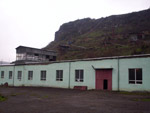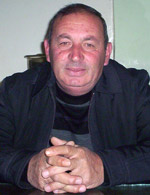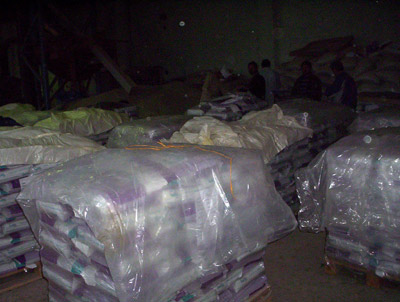Finding a Niche in the European Pet Market?
 Armenian Made “Natural” Cat Litter Boxes Exported to Holland Located in northern Tavoush Marz, the town of Ayroum was famous for being a center of manufacturing during the Soviet era. The canning factory, once buzzing with conveyor belts and machines, now operates at minimum capacity. This year, only a tiny amount of berries have been preserved. Only one small production plant operates on a regular basis here.
Armenian Made “Natural” Cat Litter Boxes Exported to Holland Located in northern Tavoush Marz, the town of Ayroum was famous for being a center of manufacturing during the Soviet era. The canning factory, once buzzing with conveyor belts and machines, now operates at minimum capacity. This year, only a tiny amount of berries have been preserved. Only one small production plant operates on a regular basis here.
There is a one-story but long green building on the site of the former packaging unity. The “Parart CJSC” has purchased about 4 hectares of the Ayroum packaging plant. For the past four years, the company has been fulfilling a special contract order. It produces “natural cat litter boxes” for export to Holland.  Plant Director Samvel Galstyan says that this is a special order. “The toilets contain bentonite powder and certain additives. We send the kitty toilets to Holland. We’ve already shipped two full containers. In Europe, people love animals, including cats. The litter box is placed in a corner of the room and the cat does his business in it. The bentonite absorbs the foul odors so that the house doesn’t stink.” (Bentonite is an absorbent aluminum phyllosilicate, generally impure clay. Bentonite can be used in cement, adhesives, ceramic bodies, and cat litter) The plant gets its bentonite powder trucked in from the Ijevan Bentonite Factory. The rest of the components come from Iran. The Armenian from Holland who has placed the order also sends some of the additives. The finished product is then transported to the port of Poti via cargo truck. Director Galstyan says their main product is concentrated zeo-carbon fertilizer. The company gets its raw materials from a zeolite mine it operates in the Koghb village. (Zeolites are microporous, aluminosilicate minerals commonly used as commercial adsorbents). 1,000 tons of the stuff is stored on top of the plant. It flows down through a pipe, where it is then dried and used in the production process. The Ayroum plant employs ten workers, all local residents. They do the packaging and receive 2,500 AMD (about $7 US for a day’s work). The fertilizer is used throughout Armenia and last year 500 tons were sent to Artsakh.
Plant Director Samvel Galstyan says that this is a special order. “The toilets contain bentonite powder and certain additives. We send the kitty toilets to Holland. We’ve already shipped two full containers. In Europe, people love animals, including cats. The litter box is placed in a corner of the room and the cat does his business in it. The bentonite absorbs the foul odors so that the house doesn’t stink.” (Bentonite is an absorbent aluminum phyllosilicate, generally impure clay. Bentonite can be used in cement, adhesives, ceramic bodies, and cat litter) The plant gets its bentonite powder trucked in from the Ijevan Bentonite Factory. The rest of the components come from Iran. The Armenian from Holland who has placed the order also sends some of the additives. The finished product is then transported to the port of Poti via cargo truck. Director Galstyan says their main product is concentrated zeo-carbon fertilizer. The company gets its raw materials from a zeolite mine it operates in the Koghb village. (Zeolites are microporous, aluminosilicate minerals commonly used as commercial adsorbents). 1,000 tons of the stuff is stored on top of the plant. It flows down through a pipe, where it is then dried and used in the production process. The Ayroum plant employs ten workers, all local residents. They do the packaging and receive 2,500 AMD (about $7 US for a day’s work). The fertilizer is used throughout Armenia and last year 500 tons were sent to Artsakh.  I ask Samvel Galstyan why the fertilizer isn’t used more widely in Armenia if it is so good. He replies that village farmers in Armenian are accustomed to using a selitra-based fertilizer. He claims that anyone who uses the zeo-carbon item is truly impressed with its results. Mr. Galstyan uses it to fertilizer 1.5 acres of peach trees he owns in the village of Artchis. He has lightly tilled the soil around the trees and has sprinkled the fertilizer. He is pleased with the results. A sack of the zeo-carbon fertilizer goes for 8,500 AMD. I ask him if this isn’t expensive compared to traditionally used fertilizers. “If we take into account the efficacy of this fertilizer, then it certainly isn’t costly,” says Mr. Galstyan. He says that in the past, plant workers got a sack each for free as a gift. I try to find out the names of the company owners. “I don’t know their names. They’re probably 4 or 5 of them, from Yerevan. They do the investing. I only manage the plant. The director is Hayrapet Davtyan,” Mr. Galstyan says. I never was able to find out who exactly owns “Parart CJSC”. Knowing how things work in Armenia, it’s hard to imagine that the three hectare production site manufacturing odor absorbing kitty boxes and quality fertilizer wasn’t just handed over to any Tom, Dick or Harry. Nevertheless, in a rural community like Ayroum beset with staggering unemployment, each new business or operation is to be welcomed.
I ask Samvel Galstyan why the fertilizer isn’t used more widely in Armenia if it is so good. He replies that village farmers in Armenian are accustomed to using a selitra-based fertilizer. He claims that anyone who uses the zeo-carbon item is truly impressed with its results. Mr. Galstyan uses it to fertilizer 1.5 acres of peach trees he owns in the village of Artchis. He has lightly tilled the soil around the trees and has sprinkled the fertilizer. He is pleased with the results. A sack of the zeo-carbon fertilizer goes for 8,500 AMD. I ask him if this isn’t expensive compared to traditionally used fertilizers. “If we take into account the efficacy of this fertilizer, then it certainly isn’t costly,” says Mr. Galstyan. He says that in the past, plant workers got a sack each for free as a gift. I try to find out the names of the company owners. “I don’t know their names. They’re probably 4 or 5 of them, from Yerevan. They do the investing. I only manage the plant. The director is Hayrapet Davtyan,” Mr. Galstyan says. I never was able to find out who exactly owns “Parart CJSC”. Knowing how things work in Armenia, it’s hard to imagine that the three hectare production site manufacturing odor absorbing kitty boxes and quality fertilizer wasn’t just handed over to any Tom, Dick or Harry. Nevertheless, in a rural community like Ayroum beset with staggering unemployment, each new business or operation is to be welcomed.
 Videos
Videos Photos
Photos
Write a comment